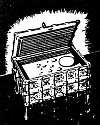 If you should have occasion to visit Oberlin College you will see
some of these first globules of Hall's aluminum displayed in the
Severance Chemical Laboratory. They are in a hand-wrought aluminum
jewel casket labelled "The Crown Jewels" of aluminum.
If you should have occasion to visit Oberlin College you will see
some of these first globules of Hall's aluminum displayed in the
Severance Chemical Laboratory. They are in a hand-wrought aluminum
jewel casket labelled "The Crown Jewels" of aluminum. At the age of 22, Hall had succeeded where some of the world's best-known scientists had failed. We have often said the desire to do a thing is more important than the knowledge of how to do it. But the young inventor ran up against the situation that confronts nearly everyone who brings out a new thing, the problem of convincing the world he had something valuable. This took another two years until three Pittsburgh men raised $20,000.00 to finance the new enterprise calling it the Pittsburgh Reduction Company. |








